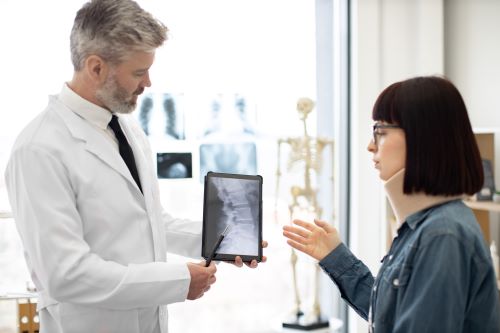Chronic pain is a common and often debilitating consequence of car accidents, impacting both physical and mental well-being. Whether it stems from whiplash, nerve damage, spinal injuries, or soft tissue trauma, car accident pain can disrupt daily life and diminish overall quality of life. Effectively managing chronic pain requires a multifaceted approach that addresses both the physical and psychological aspects of recovery.
This blog delves into the causes and types of chronic pain after car accidents, common injuries, symptoms, and treatment options, and highlights the critical role of consulting an experienced car accident doctor for effective diagnosis and recovery.
Causes and Types of Chronic Pain
Chronic pain is a common aftermath of car accidents. Understanding the injuries, including severe injuries, that lead to this condition is crucial for effective management and recovery. Various injuries can result in chronic pain, often stemming from trauma during the accident. Recognizing these injuries helps in devising a suitable treatment plan.
Overview of Injuries Leading to Chronic Pain
Several injuries can result from a car accident, leading to persistent pain. Here are some of the most common:
- Whiplash and Associated Disorders: Whiplash occurs when the head is jerked backward and forward. This can damage soft tissues in the neck and lead to ongoing discomfort.
- Herniated Discs and Spinal Column Issues: A collision’s impact can cause discs in the spine to bulge or rupture. This can press on nearby nerves, resulting in severe pain and mobility issues.
- Traumatic Brain Injuries (TBI): A car accident can lead to TBIs, which may cause long-term cognitive and physical challenges. Symptoms can include headaches, dizziness, and difficulty concentrating.
- Fractures and Complications from Broken Bones: Broken bones are common in car accidents. Complications such as improper healing or nerve damage can contribute to chronic pain.
- Soft Tissue Injuries: Injuries to muscles, ligaments, and tendons can result in persistent pain. These injuries often take time to heal and can lead to ongoing discomfort.
- Shoulder Injuries: The force from a collision can focus on one shoulder due to the seatbelt restraint, leading to strains and ligament tears. These injuries can result in chronic shoulder pain if not addressed.
- Shoulder Pain: This can manifest immediately or hours after a collision and may be associated with other conditions like whiplash. Seeking medical attention for severe shoulder pain is crucial.
Conditions Such as Fibromyalgia, CRPS, and CPS
In addition to the injuries mentioned, certain conditions may develop or be exacerbated following a car accident, leading to individuals experiencing chronic pain:
- Fibromyalgia: This condition is characterized by widespread pain, fatigue, and tenderness in specific areas. It can be triggered or worsened by trauma, including car accidents.
- Complex Regional Pain Syndrome (CRPS): CRPS is a chronic pain condition that usually affects a limb after an injury. Symptoms include severe pain, swelling, and changes in skin color or temperature.
- Chronic Pain Syndrome (CPS): This condition involves ongoing pain that lasts longer than the expected healing time. It can be related to various injuries sustained during a car accident.
Common Injuries Leading to Chronic Pain
Chronic pain can stem from various injuries sustained during a car accident. Understanding these injuries is crucial for effective management and recovery. Here are some of the most common injuries that can lead to persistent pain:
Abdominal pain can also be a consequence of car accidents, potentially indicating internal injuries such as bruising or swelling. It is crucial to seek medical attention if abdominal pain occurs, as it could signal life-threatening conditions like internal bleeding.
Whiplash and Associated Disorders
Whiplash is one of the most prevalent injuries following a car accident. It occurs when the head is suddenly jolted forward and then back, straining the neck muscles and ligaments. This injury can lead to chronic neck pain, headaches, and stiffness. In some cases, individuals may develop whiplash-associated disorders, which include ongoing pain and neurological symptoms that can last for months or even years.
Herniated Discs and Spinal Column Issues
A herniated disc happens when the soft tissue between the vertebrae in the spine slips out of place, pressing on nearby nerves. This condition can cause severe back pain, leg pain, and numbness. Chronic pain from herniated discs often requires ongoing treatment and can significantly affect mobility and daily activities.
Traumatic Brain Injuries and Their Long-Term Effects
A traumatic brain injury (TBI) can result from a sudden impact during a car accident. Symptoms may include headaches, dizziness, and cognitive difficulties. Chronic pain can develop as a result of nerve damage or changes in brain function, leading to ongoing issues that require specialized care.
Fractures and Complications from Broken Bones
Fractures are common in car accidents and can lead to chronic pain if not treated properly. Complications such as improper healing or the development of arthritis can result in persistent discomfort. Individuals with broken bones often face a lengthy recovery process, and some may experience ongoing pain even after the injury has healed.
Soft Tissue Injuries and Persistent Pain
Soft tissue injuries, including strains and sprains, are frequent in car accidents. These injuries can lead to chronic pain due to inflammation and muscle tension. Over time, the affected areas may become sensitive, causing discomfort during everyday activities. Proper rehabilitation is essential to address these injuries and minimize long-term effects.
Symptoms of Chronic Pain
Chronic pain can manifest in various ways, making it essential to recognize the symptoms early. Understanding these symptoms can help you seek appropriate treatment and support.
Identifying Headaches, Nerve Pain, and Widespread Pain
Headaches are a common symptom following a car accident. These can range from tension headaches to migraines. Nerve pain often presents as sharp, shooting sensations or numbness, particularly in the limbs. Widespread pain, which affects multiple areas of the body, may also occur. This type of pain can feel like a constant ache or burning sensation and is often linked to conditions like fibromyalgia.
Psychological Impacts: Anxiety, Depression, and Cognitive Difficulties
Chronic pain doesn’t just affect the body; it can also take a toll on mental health. Many individuals experience anxiety and depression as they cope with persistent pain. This emotional burden can lead to cognitive difficulties, such as trouble concentrating or memory issues. It’s crucial to address these psychological impacts, as they can further complicate recovery and pain management.
Treatment Options
When dealing with chronic pain after a car accident, various treatment options are available to help manage symptoms and promote healing. Each individual may respond differently to treatments, so it is essential to explore a combination of approaches tailored to your specific needs.
Medical Interventions for Pain Management
Medical professionals often recommend different interventions to address chronic pain. These may include:
- Medications: Over-the-counter pain relievers such as ibuprofen or acetaminophen can help alleviate mild pain. For more severe cases, prescription medications like opioids or muscle relaxants may be necessary. Always consult with a healthcare provider before starting any medication.
- Injections: In some cases, corticosteroid injections may be used to reduce inflammation and provide temporary relief from pain. This approach can be particularly helpful for conditions like herniated discs or joint pain.
- Interventional Procedures: Techniques such as nerve blocks or radiofrequency ablation can target specific nerves responsible for pain, offering relief for chronic conditions.
Therapeutic Approaches
In addition to medical interventions, various therapeutic methods can aid in managing chronic pain:
- Physical Therapy: Engaging in a structured physical therapy program can help restore function and strength. Physical therapists design personalized exercises to improve mobility and reduce pain.
- Massage Therapy: This hands-on approach can relieve muscle tension and improve circulation. Many individuals find that regular massage sessions help manage chronic pain symptoms effectively.
- Chiropractic Care: Chiropractors focus on spinal alignment and overall body mechanics. Chiropractic adjustments may provide relief from pain, particularly in cases of neck or back injuries.
Lifestyle Modifications
Incorporating lifestyle changes can also play a crucial role in chronic pain management:
- Exercise: Regular, low-impact exercise can strengthen muscles and improve flexibility. Activities like walking, swimming, or yoga are often recommended.
- Diet: A balanced diet rich in anti-inflammatory foods can help reduce pain levels. Foods like fruits, vegetables, whole grains, and omega-3 fatty acids are beneficial.
- Stress Management: Chronic pain can be exacerbated by stress. Techniques such as meditation, deep breathing exercises, and mindfulness can help manage stress levels and improve overall well-being.
Importance of Medical Attention
After a car accident, obtaining medical attention is crucial. Early diagnosis can significantly impact your recovery journey and overall well-being. Many injuries may not show immediate symptoms, but they can lead to chronic pain if left untreated.
Early Diagnosis and Treatment of Car Accident Injuries
Seeking medical care right after an accident helps identify injuries that may not be apparent. For instance, whiplash injuries can take time to manifest. A doctor can perform a thorough examination and recommend appropriate imaging tests, such as X-rays or MRIs, to uncover hidden issues.
Receiving timely treatment can prevent complications. For example, a herniated disc can worsen without intervention, leading to severe nerve pain and mobility issues. Addressing injuries promptly can also promote healing and restore function more effectively.
The Role of Primary Care Physicians and Medical Professionals
Your primary care physician plays a vital role in your recovery. They can develop a comprehensive treatment plan tailored to your needs. This may include referrals to specialists such as physical therapists or pain management experts.
Additionally, medical professionals can help document your injuries and treatment progress. This documentation is essential for any potential compensation claims. It provides evidence of the pain and suffering caused by the accident, which can be crucial in legal contexts.
Seek Treatment From an Experienced Car Accident Doctor ASAP!
If you’re struggling with chronic pain after a car accident, don’t wait to seek help. At Georgia Spine & Orthopaedics, our experienced team specializes in diagnosing and treating accident-related injuries, helping you find relief and regain your quality of life.
Contact us at 678-929-4494 to schedule an appointment today!






